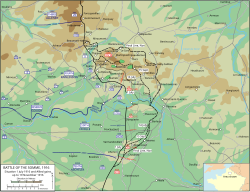| Capture of La Boisselle | |||||||
|---|---|---|---|---|---|---|---|
| Part of the Battle of the Somme, First World War | |||||||
 Battle of the Somme 1 July – 18 November 1916 | |||||||
| |||||||
| Belligerents | |||||||
|
|
| ||||||
| Commanders and leaders | |||||||
| Douglas Haig | General Erich von Falkenhayn | ||||||
| Strength | |||||||
| 2 divisions | 3 regiments | ||||||
| Casualties and losses | |||||||
| 9,860 | 1,601 (incomplete) | ||||||
The Capture of La Boisselle (1–6 July 1916) was a tactical incident during the Battle of Albert, the name given by the British to the first two weeks of the Battle of the Somme. The village of La Boisselle forms part of the small commune of Ovillers-la-Boisselle about 22 mi (35 km) north-east of Amiens in the Somme department in Picardie in northern France. To the north-east of La Boisselle lies Ovillers; by 1916, the village was called Ovillers by the British Expeditionary Force (BEF) to avoid confusion with La Boisselle, south of the road.[1]
On 1 July 1916, the first day on the Somme, La Boisselle was attacked by the 34th Division, III Corps but the bombardment had not damaged the German deep-mined dug-outs (minierte Stollen) and a German listening post overheard a British telephone conversation the day before, which gave away the attack. The III Corps divisions suffered more than 11,000 casualties and failed to capture La Boisselle or Ovillers, gaining only small footholds near the boundary with XV Corps to the south and at Schwabenhöhe (Swabian heights), a field fortification in the German front line, after the explosion of the Lochnagar mine had destroyed some of its defences.
The advance of the 103rd Brigade was over ground with a fold, which meant that the disaster of the attack by preceding brigades occurred in dead ground. As the 103rd Brigade advanced from behind the British front line, it was engaged by artillery and machine-gun fire, which inflicted 70 per cent casualties before the troops reached the British line. The 19th (Western) Division was rushed forward from reserve, in case of a German counter-attack on Albert and to continue the attack, most of the village was captured by 4 July and the operation was complete by 6 July.
- ^ Gliddon 1987, p. 338.
© MMXXIII Rich X Search. We shall prevail. All rights reserved. Rich X Search

